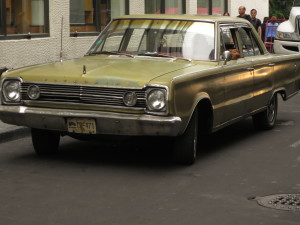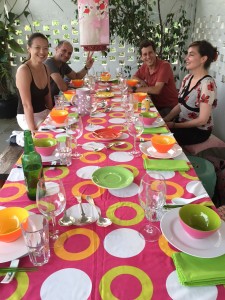- Details
Hong Kong, my Hong Kong
I’ve been home a week, and Mexico is merely a dream again. Only the photos and a couple of excellent fridge magnet plus a beautiful pendant I got from a real Mexican girl, remind me that I was ever there. Sigh.
Coming home was a bit of an anti-climax. I had nothing to look forward to anymore and everything I looked at was so familiar. That was such a bore after two weeks in which everything I looked at was new (except Memphis) and everyone I met was new and (especially in truck stops) interesting-looking.

But oh, how I love Hong Kong. It’s home! And I love the Cantonese language now more than ever. In the States, although I felt I fitted right in with the Southern locals despite, I have to say, being better dressed, people always asked me where I was from. I always said, with pride: Hong Kong. “Oh, I love your accent”, many then said.
So I might as well live here where everybody asks me where I’m from and when I say Hong Kong they say “No!”
You know what would make Hong Kong even better though? If Sichuan food was the national food here. Fortunately I can cook it, and I must say I uttered a sigh of relief the second day after I came back and could fire up the old stove and start chopping my favourite vegetable (tuber?) – lotus root! And soy beans! Yam yam yammity yam.

Please come to my restaurant in Pui O this autumn. The weather is lovely, the food great and the beer cold. But if you can’t be arsed to drag yourself all the way to Lantau, buy my book and start cooking for yourself! You’ll thank me for it later.
返咗嚟 (faan jo lei – have come back)
蓮藕 (Lin au – lotus root)
貝澳 (Bui ou – Shell Inlet/”Pui” O)
- Details
New Service!
Ah – so beautiful, so civilised. Doesn’t she look like an advert for a particularly expensive brand of tea? But guess what, she’s not. She’s just having her weekly dose of lovely Cantonese, right in her own neighbourhood!
Yes, people who live on Lantau, Happy Jellyfish People’s democratic Language Bureau has started a new service just for you, right in the heart of Pui O, 40 seconds’ walk from the main road.
We do regular courses, crash courses in specific topics as well as how to read and write Chinese characters, and stuff like arrange Sichuan lunches or dinners for up to 20 people.
Pui O is now a HUB of culture, art and joy! Swing around today. Our large roof garden overlooking the South China Sea has four ceiling fans…
- Details
SUNDAY: Scary Halloween Coming Up and Fast… and Thick?
Happy Sunday!
Now, I like to dress up as much as the next man, whoever he is. But recently I haven’t made any films (my film camera sadly died in Mexico and I don’t want to buy a new one before I see if it can be fixed. That’s right, young people of today. FIXED!) and so I’ve had no excuse to put on the old moustache, whether for ah-Mok (see above) or Mister Public Security Uncle.

But today I looked at the calendar and saw that October 31st is hurtling towards us with great force. And if there’s one day you can dress up with impunity without having to use a film camera as an excuse, it’s that day!
Lan Kwai Fong will probably be unbearable Saturday night, but how about the periphery of Wan Chai? Who wants to go bar hopping with a very stern mister public security uncle, drinking beer through a straw?
If you don’t have a costume it doesn’t matter – I have fresh moustaches from Mexico! Let’s scare with beer!
禮拜日 (Lai bai yat – Sunday)
公安 (Gong on – public security)
亞叔 (Ah-Suk – Uncle (father’s younger brother)
鬍鬚 (wu sou – moustache, beard)
- Details
Autumn in Tokyo
Wei, language enthusiasts everywhere, or should I say: Konichiwa! Or Bunka kakumei! (Cultural revolution) Yes, I’ve been to Tokyo (東京)and what a lovely trip it was. The air was so fresh, the train stations so beautifully designed, and everyone, I discovered to my delight, talked to me in Japanese!
What, that’s not so strange, you think, seeing they were Japanese? I agree. It shouldn’t be strange. But considering the fact that my Japanese is limited to the old “where is the …” “do you have …” “Is there a …” “Togetherness in nakedness” (hadakano tsukiyai) “honourable beer please” ( o biru kudasai) and commenting favourably on the weather, it was amazing that suddenly I was in Japan having long conversations in non-existent Japanese about really non-interesting things!
Because guess what, if you can say a few words in Japanese, people think you can actually speak it, and they also respect your efforts to learn the language by treating you as if you can. And that’s why foreigners who live in Japan for any period of time, inevitably do learn the language.
I was thinking about that as I touched down at shiny Chek Lap Kok (should be pronounced “Gok”) airport,(did you know HK’s airport is named after a kind of fish?) at midnight and after having left my friend’s house in Yokohama about 12 hours earlier so a little bit tired and worn out.
I tried to lift my luggage off the conveyor belt but happened to stand behind a kind of barrier (they use to … avoid stampedes at the airport?) and a lime-green jacket person immediately galloped forth.
Him: “Meh-dem! Tekk kee-ah! Tekk kee-ah!” (Madam, take care, take care)
Me: 你唔駛講英文 (You don’t have to speak English)
"Tekk kee-ah! Is danger!”
講廣東話呀,唔該。 (Speak Cantonese please)
“Meh-dem! Tekk kee-ah!”
你唔識講廣東話呀。 (You don’t speak Cantonese?)
Him: 識! (I do)
Of course he did. That’s why he got a job at the airport. With a sigh – back to people who treat me like an idiot AND think I can’t lift my own tiny suitcase – I headed for the exit, where there was a transport service desk. Spake:
"唔該,幾點鐘有巴士去梅窩呀?" (Excuse me, what time is the bus to Mui Wo?)
He looked at me as if I’d said something completely different, like “I’m going to disembowel you now.” I smiled pleasantly and patiently like a cobra, repeating the question. He fell back to earth with a thud.
“Wann teh-tee.” (1.30)
你講乜野呀? (What did you say?)
“Wann teh-tee.”
我唔識聽英文,你講乜野呀? (I don’t understand English, what did you say?)
“Wann teh-tee. At duh mitt-lie.” (at the midnight)
講廣東話呀,唔該。 (Speak Cantonese, please.) Yes, childish and ridiculous, I know. But the reason I speak Cantonese today, is that I never engage in English conversation with HK people. Ever. It’s become a habit and I will spend the time it takes to get local people to speak to me in the local language.
Now he was starting to look panic-stricken. I again asked what time the bus to Mui Wo left, speaking slowly and clearly – perhaps he didn’t understand my normal, kind of street-y Cantonese because he was too refined? This time he wrote 1.30 on a piece of paper, pointing wordlessly to the number. Yes, yes, just because someone can speak a language fluently doesn’t mean they can understand a single word, right?
So that was a sad homecoming. Especially since this kind of behaviour from HK people is so far in the past I can’t remember it anymore. It’s probably because he worked in an airport that his brain just packed it in and refused to do the decent thing when faced with the impossible, the one thing that cannot be: White face uttering yellow words.
I can see why some of my students give up, while I just dig in deeper. But if it’s any comfort, there comes a day in all Cantonese learners’ life when the person you’re talking to in Cantonese just answers you in that language as if you were a normal human being. That happens all the time to me now. And that’s why the airport incident made me so incredibly disappointed. Especially after having been treated so well in Japanese, which I don’t speak at all!
Contact us today
Email info@learncantonese.com.hk
to find out how you can start learning Cantonese.







